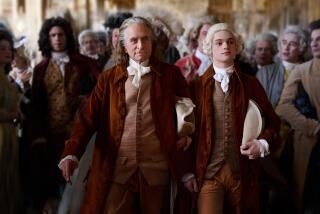‘Lincoln’ triumphs with a humanizing touch, critics say
Given that Steven Spielberg’s historical drama “Lincoln” combines one of Hollywood’s biggest directors and one of America’s greatest heroes, it’s not hard to imagine the result being an epic, reverential portrait of the 16th president. Instead, however, Spielberg, screenwriter Tony Kushner and star Daniel Day-Lewis have treated Lincoln as more man than myth and focused on the political wrangling he orchestrated to end the Civil War and pass the 13th Amendment outlawing slavery.
The decision seems to have been a shrewd one, as critics are nearly unanimous in praising the film.
The Times’ Kenneth Turan says the film’s success begins with Kushner’s “excellent script” (based on parts of Doris Kearns Goodwin’s book “Team of Rivals: The Political Genius of Lincoln”), which is “smart, dramatic and confident of the value of what it has to say.” Building on Kushner’s solid foundation, Spielberg’s touch is assured without being showy: “There is nothing bravura or overly emotional about Spielberg’s direction here, but the impeccable filmmaking is no less impressive for being quiet and to the point,” Turan writes, adding “he’s there in service of the script and the acting, to enhance the spoken word rather than burnish his reputation.”
PHOTOS: ‘Lincoln’ premiere at AFI Fest
The acting, of course, begins with Day-Lewis, and Turan finds him more than up to the task: “even those used to the way he disappears into roles will be startled by the marvelously relaxed way he morphs into this character and simply becomes Lincoln.” Most of all, Day-Lewis brings Lincoln to life as “a deeply human individual.”
The Washington Post’s Ann Hornaday similarly declares “Lincoln” a “masterful portrait of the 16th U.S. president,” and one that avoids “safe, starchy hagiography.” She writes, “instead of a grand tableau vivant that lays out the great man and his great deeds like so many too-perfect pieces of waxed fruit, Spielberg brings the leader and viewers down to ground level.” The film shows Lincoln the politician at work, and “It’s the fascinating world of horse-trading, truth-shaving, ‘shady work’ and back channels that [the film] brings to life most exhilaratingly.”
The Boston Globe’s Ty Burr, who calls “Lincoln” “a rip-roaring entertainment, brain food that’s tasty and good for you,” finds considerable pleasure in “the many characters and performances that strut across its stage.” The dizzying supporting cast includes Tommy Lee Jones, David Strathairn, James Spader, John Hawkes and Sally Field (whose “performance is a beautiful thing”), to name only a few.
A.O. Scott of the New York Times characterizes “Lincoln” as “less a biopic than a political thriller, a civics lesson that is energetically staged and alive with moral energy,” and he too credits the trio at the heart of the film. “Kushner, whose love of passionate, exhaustive disputation is unmatched in the modern theater, fills nearly every scene with wonderful, maddening talk,” while “Spielberg’s best art often emerges in passages of wordlessness, when the images speak for themselves.” Day-Lewis, for his part, “eases into a role of epic difficulty as if it were a coat he had been wearing for years.”
The San Francisco Chronicle’s Mick LaSalle finds one aspect of Day-Lewis’ portrayal particularly effective: his high-pitched voice, which matches historical accounts of Lincoln if not our own popular conceptions. “The voice takes Lincoln down from his memorial and transforms him,” LaSalle writes, “from a timeless sage back into the product of particular time and place, the mid-19th century, the American frontier.” He adds, “Let’s just say it: The experience of watching Daniel Day-Lewis in this role is nothing less than thrilling. This is Lincoln. No need for a time machine, there he is.”
ALSO:
Photos: Lessons from the campaign trail on film
‘Lincoln’ was a tall order for Spielberg, Day-Lewis
‘Lincoln’ gives Virginia’s film industry a presidential lift
PHOTOS AND MORE:
VIDEO: A guide to upcoming movies
The Envelope: Awards Insider
PHOTOS: NC-17 movies: Ratings explained
More to Read
Only good movies
Get the Indie Focus newsletter, Mark Olsen's weekly guide to the world of cinema.
You may occasionally receive promotional content from the Los Angeles Times.








